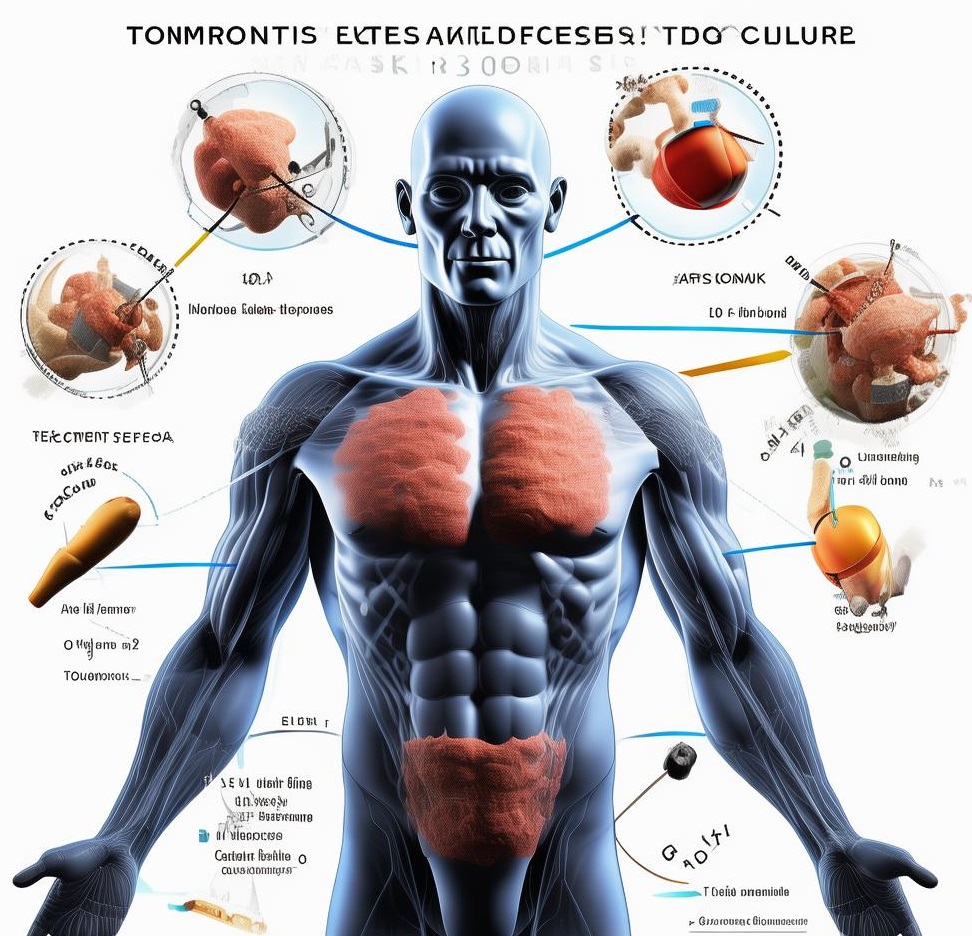Testosterone, also known as testosterone, is an important male hormone, mainly secreted by the testicles.
Testosterone plays a vital role in male sexual function, not only affecting the development and function of the reproductive system, but also having a profound impact on male sexual behavior, sexual psychology and quality of life.
This article will briefly introduce the physiological mechanism of testosterone, its role in male sexual function and its regulation.
The physiological mechanism of testosterone
The physiological mechanism of testosterone involves the synthesis, secretion, transportation, action and metabolism of hormones. The following are the main physiological mechanisms of testosterone:
1. Synthesis and Secretion of Testosterone
The synthesis and secretion of testosterone takes place mainly in the Leydig cells of the testis. Under the action of luteinizing hormone (LH), cholesterol is converted into testosterone through a series of enzymatic reactions. After testosterone is secreted, it reaches target organs through blood circulation and exerts biological effects.

2. Metabolism of Testosterone
Testosterone can be converted into biologically active metabolites such as estradiol and dihydrotestosterone in the body. Among them, dihydrotestosterone is the main active form of testosterone and has a more significant impact on male sexual function.
3. Testosterone Receptors
The biological effects of testosterone are primarily achieved by binding to its receptors. Testosterone receptors are widely distributed in various tissues throughout the body, such as reproductive organs, muscles, bones, cardiovascular system, etc. After testosterone binds to receptors, it can regulate the expression of related genes and affect cell growth, differentiation and metabolism.
The Role of Testosterone in Male Sexual Function
Sex and testosterone are closely related, running through the three levels of physiology, psychology and society. Understanding the impact of testosterone on sexual behavior can help us better understand ourselves, adjust our sexual concepts and improve the quality of our sex life.
Promote The Development of Reproductive Organs
Testosterone plays an important role in the development of male reproductive organs. During the embryonic period, testosterone promotes the differentiation of reproductive organs into males;
During puberty, testosterone levels increase, promoting the maturation of reproductive organs such as testicles, penis, and scrotum.
Maintain Normal Sexual Desire
Testosterone is a key factor in maintaining male sexual desire. When testosterone levels are low, male sexual desire will be significantly reduced, and even sexual indifference will occur. Conversely, when testosterone levels increase, sexual desire will also increase accordingly.
Promote Sperm Production
Testosterone has a promoting effect on sperm production. Testosterone affects the sperm production process by regulating the testosterone receptors on spermatogenic cells.
When testosterone levels are low, it may lead to a decrease in sperm count, decreased vitality, and even infertility.
Maintain Erectile Function
Testosterone plays an important role in penile erectile function. Testosterone can promote the growth and development of the corpus cavernosum of the penis and increase blood flow during penile erection, thereby maintaining normal erectile function. When testosterone levels are low, the erectile function of the penis will be seriously affected.
Affecting Sexual Behavior
Testosterone has a regulatory effect on male sexual behavior. Men with high testosterone levels tend to be more aggressive, competitive, and sexually aroused. Men with low testosterone levels may show introverted and timid sexual psychology.
Regulation of Testosterone
The regulation of testosterone is a complex physiological process involving interactions at multiple levels, mainly including the following mechanisms:
Hypothalamus-Pituitary-Testis Axis
The hypothalamus-pituitary-testis axis is the main pathway for regulating testosterone secretion. The hypothalamus secretes gonadotropin-releasing hormone (GnRH), which acts on the pituitary gland to promote the secretion of luteinizing hormone (LH) and follicle-stimulating hormone (FSH). LH acts on the testicles to promote the synthesis and secretion of testosterone.
Neuroendocrine Regulation
The nervous system regulates the secretion of testosterone through substances such as neurotransmitters and neuropeptides. For example, when the sympathetic nervous system is excited, it can promote testosterone secretion; while when the parasympathetic nervous system is excited, it inhibits testosterone secretion.
Immune System Regulation
Recent studies have found that the immune system is also involved in the regulation of testosterone. For example, the testosterone receptors on the interstitial cells of the testicles can be regulated by immune cells, affecting the secretion of testosterone.
Effects of Low Libido on Sex
Low libido refers to a decrease in an individual’s interest and desire for sexual activity. This phenomenon can have a multi-faceted impact on sex life, and testosterone plays a key role in regulating sexual desire.
- Reduced frequency of sexual life: Low libido directly leads to a decrease in an individual’s interest in sex life, which in turn reduces the frequency of sex life.
- Decreased quality of sex life: Low libido may affect the pleasure and satisfaction of sex life, leading to a decrease in the quality of sex life.
- Tension in partner relationships: Mismatched sexual desire may lead to communication barriers and emotional alienation between partners, and even cause quarrels and dissatisfaction.
- Increased psychological pressure: Low libido may bring anxiety, inferiority and frustration to individuals, increasing psychological pressure.
- Physiological effects: Long-term low libido may lead to reduced blood circulation in the reproductive organs, which may in turn affect erectile function and reproductive health.
- Fertility issues: Low libido may lead to a decrease in the number of sexual intercourse, thereby affecting fertility plans.
Effects of Testosterone on Sexual Desire
The effects of testosterone on sexual desire are multifaceted. This male hormone plays a key role in regulating and stimulating sexual desire, especially in men. Here are some specific effects of testosterone on sexual desire:
- Stimulate sexual desire: Testosterone is the main hormone that regulates sexual desire. It stimulates sexual desire by enhancing the response to sexual stimulation in the brain.
- Maintain sexual function: Testosterone helps maintain male erectile function and orgasm, and plays an important role in maintaining and enhancing sexual desire.
- Promote the sensitivity of sex hormone receptors: Testosterone can increase the sensitivity of sex hormone receptors, making sexual stimulation more effective.
- Affect emotions and behavior: Testosterone levels not only affect physiological sexual desire, but are also related to emotions, self-confidence, and aggressive behavior, which indirectly affect sexual desire.
- Regulate the development of reproductive organs: Testosterone is essential for the development and maturation of reproductive organs, including the growth of the penis and testicles, which are related to sexual desire.
- Affect sexual psychology: Testosterone levels have an impact on sexual psychology. Men with higher testosterone levels may be more confident and positive, which helps to increase sexual desire.
The impact of low libido on sex life is multifaceted, and testosterone plays a key role in regulating sexual desire. A decrease in testosterone levels may lead to low libido, while testosterone supplementation or other treatments can increase libido, improve the quality of sex life and partner relationships.
However, changes in testosterone levels may also be affected by a variety of factors, including age, health status, lifestyle, and psychological state. Therefore, for the problem of low libido, individual differences should be considered comprehensively, and professional medical help should be sought when necessary.
How to Increase Testosterone Levels?
Testosterone levels can be increased through a variety of methods, including lifestyle adjustments, dietary changes, exercise, and medication. Here are some suggestions for increasing testosterone levels:
Lifestyle Adjustments
Reduce stress: Chronic stress can lower testosterone levels. Manage stress through meditation, deep breathing, yoga, or other relaxation techniques.
Get enough sleep: Lack of sleep can affect testosterone levels. Adults should get 7-8 hours of quality sleep each night.
Maintain a healthy weight: Obesity is associated with low testosterone levels. Losing weight through a healthy diet and exercise can help increase testosterone levels.
Dietary Changes
Eat enough fat: Healthy fats, such as omega-3 fatty acids and saturated fats, are important for maintaining testosterone levels. Eat fish, nuts, and olive oil.
Increase protein intake: A high-protein diet can help increase testosterone levels. Eat protein-rich foods such as lean meats, eggs, and beans.
Supplement zinc and vitamin D: Zinc and vitamin D are essential for testosterone production. You can increase your intake of these nutrients through food or supplements.
Limit sugar and refined carbohydrate intake: A high-sugar diet may lower testosterone levels.
Sports
Strength training: Strength training, especially large muscle group exercises such as squats, deadlifts, and bench presses, can significantly increase testosterone levels.
Maintain regular exercise: Aerobic exercise can also help increase testosterone levels, but overtraining should be avoided as excessive endurance training may reduce testosterone.
Short bursts of high-intensity interval training (HIIT): HIIT can increase testosterone levels while increasing the body’s metabolism.
Medical Treatment
Testosterone replacement therapy: For patients with very low testosterone levels, your doctor may recommend testosterone replacement therapy, such as testosterone gel, patch, injection or implant.
Herbal supplements: Some herbs and supplements claim that their herbal supplements can increase testosterone levels, but their effectiveness and safety may vary from person to person.
Before trying any method to increase testosterone levels, it is best to consult a doctor or professional health advisor to ensure that the method taken is suitable for your health condition and will not interact adversely with the medications you are taking.
Conclusion
Testosterone plays a pivotal role in male sexual function, not only affecting the development and function of reproductive organs, but also having a profound impact on sexual desire, sexual behavior and other aspects.
Understanding the physiological mechanism, function and regulation of testosterone can help us better maintain male health and improve the quality of life.
In clinical practice, for patients with abnormal testosterone levels, drugs, psychological interventions and other means can be used to regulate and improve sexual function.
However, there are still many unknown areas in the study of testosterone, which need to be further explored in the future to protect men’s health.
